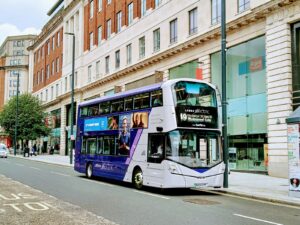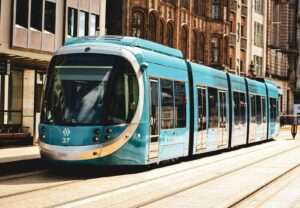We are constantly facing an acceleration of new devices, solutions, services, and products – from Uber, Amazon and Netflix. However, the transport sector has not experienced any major disruptors for quite some time. 
When it comes to land cargo transport, our minds are fresh with the picture of 18-wheelers clogging the motorways and diesel vans and trucks polluting the air.
One alternative to this is the use of electric cargo bikes, cargo bikes are a relatively new phenomenon with a history of less than a decade in the UK.
They are powered by a pedal-assisted motor and batteries, they can navigate through bike lanes and can each carry a load of up to 250kg.
Presently there are few logistics operators solely using electric cargo bikes but ecofleet is one of the main players.
We sat down with Farah Asemi, the founder and CEO of ecofleet to assess her perspective on the future of cargo bikes as an alternative to the polluting diesel vans and lorries currently used for last-mile delivery.
As a resident in London and as someone who is committed to sustainable environmental solutions, Farah has spent a long time frustrated by the congested roads and has physically suffered from exposure to air pollution.
Therefore, she launched the cargo delivery service as a first step towards providing an alternative solution for the last mile transport of goods in major metropolitan areas. She has installed a culture at ecofleet based on integrity by focusing on what really matters: optimism, premium quality customer service, and encouraging risk-taking. The vision is for the ecofleet brand to be synonymous with the best in last-mile sustainable delivery.
Farah believes that the use of electric cargo bikes will continue to grow rapidly during this decade. She sites some compelling statistics as to why this should be the case:
– At the current rate, the number of delivery vehicles in major metropolitan cities is set to grow by 36% by 2030 and as a result emissions from delivery trucks will go up by 32%.
– Toxic air leads to around 40,000 deaths in the UK and 9,000 deaths in London each year, at an annual cost of £20bn to the UK economy.
– More than 50% of the pollution comes from road transport.
– Congestion in London alone costs £9.5bn in direct and indirect costs.
Ecofleet has conducted several tests to compare the efficiency of its bike fleet to traditional vans and lorries, they found that electric cargo bikes are much more efficient in terms of time used for each parcel delivery.
By using electric motors there is no resulting air pollution, there is no time wasted to find parking, no need to pay congestion and ULEZ charges, and no over-exertion of energy by the riders thanks to the electric motor assist. The battery range can be enhanced by the riders carrying an extra battery pack and cost per drop is competitive with traditional transport means.
Farah is confident about the future of the sector and expects to see an increasing number of electric cargo bikes replacing lorries and vans for last-mile delivery. With the launch and future expansion of ecofleet into other markets Farah is trying to make a small difference towards eliminating pollution and congestion but she also believes that everyone needs to pitch in to avert further destruction of our world.
For more information on ecofleet Farah invites readers to contact her through their website
www.ecofleet.co.uk.
This article first appeared in the April Air Quality News magazine, which is available to view here.

















Leave a Reply